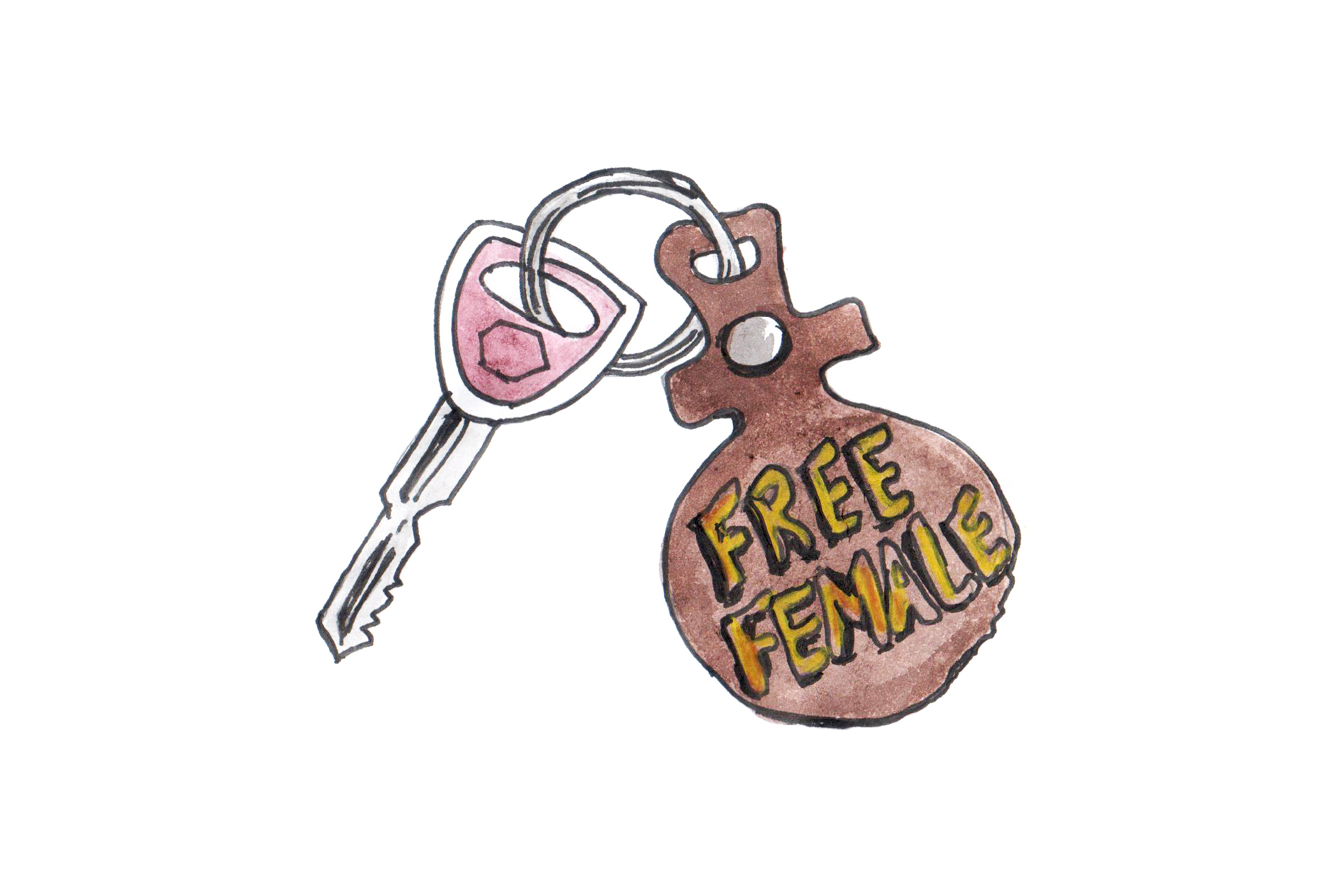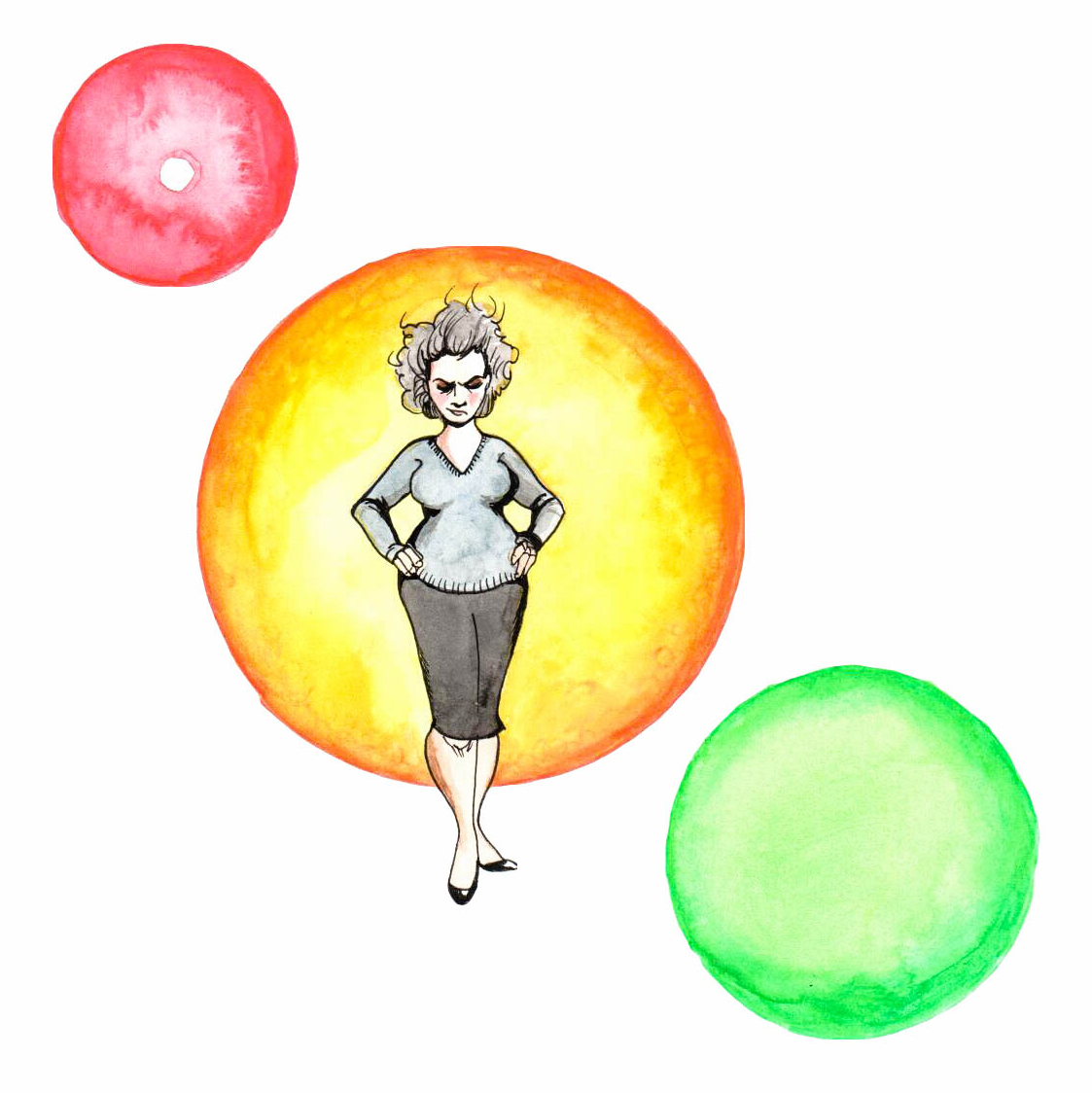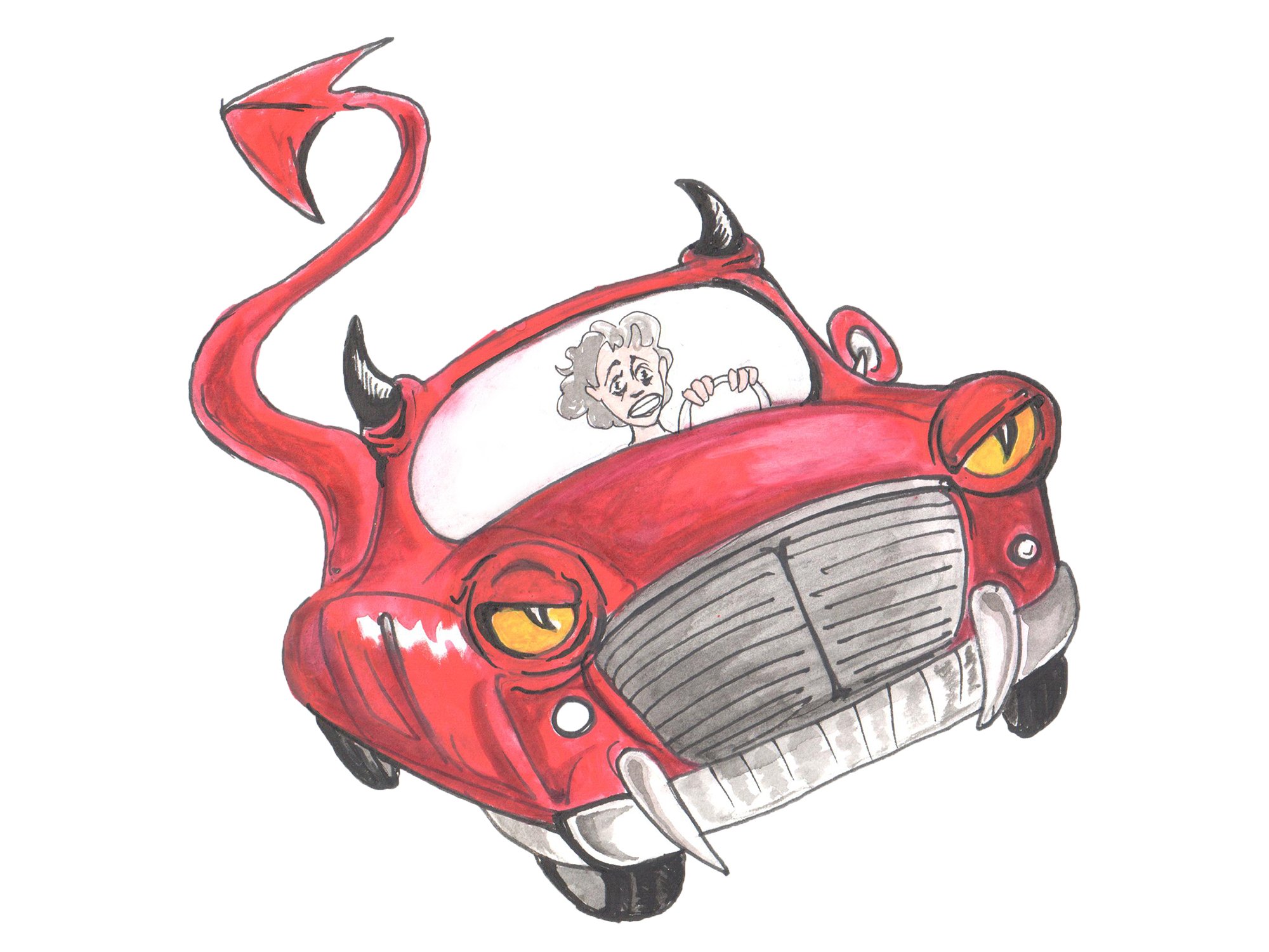On a grey Friday afternoon, I show up at the driving school, housed in a small office at the back of an insurance company, for my first lesson. The instructor, Vincent, cheerfully tells me he has been teaching for 30 years. His students have gone on to become bus drivers and police officers, positions of driving authority. “You’ll be fine,” he says.
“I haven’t driven since 1985. I don’t want to kill anyone,” I reply. He smiles, albeit with a little less certainty.
After decades of adult life — marriage, a child, work and sundry — one of my biggest shames remains the fact that I never learned to drive.
“Learn to DRIVE.” I write it every New Year’s, along with “don’t procrastinate, be nicer to people, don’t eat chips, go the gym.” I’ve never done any of it.
Now, here I am, sitting in the front seat of car listening intently to Vincent explain how to stick the key in the ignition and start the engine.
Getting along without a car in the city isn’t all that hard. I’ve been walking, riding a bike or taking the bus since I moved to Vancouver 33 years ago. I have experienced all the pros and cons. Public transit enables you stay in touch with your fellow citizens, although, as I learned first-hand, one of these fine folks might on occasion pee on you. Riding your bike is a fun and adventurous way to get around, until you get car doored. And nothing beats walking in the cold November rain, trudging through spongy banks of dead leaves, while your mascara melts down your face in thick black tracks.
I made it work. In the meantime, reasons not to get my licence continue to grow. Lyft is almost here. Self-driving cars may not be far behind. And the ethical case against cars is overwhelming. They hurt people. They’re expensive, polluting and wasteful. They run over small animals, knock over mailboxes and are turning the earth into a smelly hellish furnace.
So, why, after all this time, ruin my spotless non-driving record? What is my real auto motive (heh heh)?
I could offer easy answers. I want to get around better, see new places, feel more independent. But the real reason goes back to a cold night on a lonely highway in the Kootenays when I was 16 years old. When I tell the nice instructor that I’m afraid I might kill someone, I’m not kidding. What happened that night was a kind of bargain. In the blink of an eye, my own life was spared, but for decades afterwards I’ve let fear blockade too many turns in the journey.
When I’ve retold the story to people, I framed it as just another funny episode from a strange rural childhood, but the truth is more complicated than that. Not driving has come to stand in for active avoidance, the habit of turning tail and running away, instead of facing the things that are fucked up. The crappy part is that fear never really goes away; it just gets parked in a dark garage somewhere, idling in wait.

Some of the details of the night of December 1985 are fuzzy, others sharp as cut glass.
“Yesterday was the worst day of my life. I’m so glad that I’m here to tell myself about it instead of being in a morgue somewhere. Told Mother who almost pulled out a gun and shot me on sight.” I wrote it all down in loopy teenage script in my journal and added a couple of drawings, including a sad crying face.
I’d had a few tentative driving lessons with my parents, but no one had told me I was ready to take the wheel on my own. We lived in a log house 25 miles outside of Creston, my twin sister Avril and me, our mother, stepfather, and two younger brothers. Cars were a necessity.

It had already been a tough go in the fall of ’85. We didn’t have much money. My stepdad Len had taken a job up north to make some extra cash. It wasn’t as grim as other years, when we’d spent weekends hand-painting wooden toys to sell at the craft market, or hawking Christmas trees in the parking lot of the hardware store at the entrance of town. My brothers were too young and clueless to understand what being poor meant. But my sister and I knew the scalding mortification, praying that no one from school would see you scuffling for a bit of cash, wanting the frozen pavement to crack open and swallow you whole.
Growing up poor is shitty just about anywhere, but in a small town there are particular flavours and nuances. Within the social status system of Creston, the popular girls had beautiful teeth and giant perms. Their brothers played bantam hockey. Their fathers were doctors or businessmen. Their mothers spent a lot of time wandering up and down the aisles of Overwaitea. They shaved their legs and their armpits and they always smelled nice in a baby powder kind of way. It was like they’d been beamed out of a sitcom universe, full of rancher houses and Brady Bunch problems. I was obsessed with them, their rec rooms with padded bar stools, their ready access to Tang and Hostess Twinkies.
My own mother wore a kerchief like a Russian peasant, held women’s conscious-raising meetings in the front room of our tiny trailer, and never met a protest she didn’t want to join or lead. Her version of being grown up seemed to consist of drinking endless cups of herbal tea and talking about how depressed you were. The only other models of adulthood on the farm were my grandparents, who had their own issues, mostly around money and non-stop work.
On the farm, children as well as adults were expected to pull their own weight, whether that meant picking cherries in the summer, apples in the fall or rocks in the spring. Picking rocks was like being on a tiny chain gang, walking behind the tractor, hucking chunks of granite from the freshly plowed field onto a cart with all the bad attitude of lifelong convicts.
Before Avril and I turned 11, we’d already been drafted into operating the tractor by our grandfather, a hard man who’d come of age in the dirty thirties. He’d lost his mother to cancer when he was seven and went to work when he was 12. During haying season, he would perch on the hay-rake attached to the back of the 1942 Farmall and yell commands in farmer lingo left over from the Great Depression. “Yee and Haw,” meant turn right or left. “Bigger wheel” meant put it in a higher gear. My sister had managed to run him over twice. He’d been fixing the hitch behind the tractor, and when he asked her a question she backed up and pinned him beneath the wheel. When he screamed, she lurched forward and ran over him again. When I was driving the tractor and my grandfather yelled at me for doing something dumb, I tended to freeze at the wheel and try to drive into Kootenay Lake.
Like a lot of what we did on the farm, haying was an insane amount of work. Cutting it was only the beginning. After the stuff had dried, it had to be forked by hand onto an ancient contraption that my grandfather had welded together out of old bedframes. We used it as an impromptu jungle gym the rest of the year. We kids had developed some strategies to get out of work and do the stuff we really wanted to do like watching TV in the daytime or jumping in the hay loft. A scout, usually one of my brothers, would watch for my grandfather’s tall figure stalking across the pasture. When someone hissed “Grandpa’s coming!” we’d scramble in panic. But sometimes he caught us unaware. I remember having a child-sized heart attack when the door to the trailer slammed open one day and he came barrelling in to catch us watching Gilligan’s Island on a sunny afternoon. “Don’t work, don’t eat!” he yelled and stomped off, mad at the weather, mad at the cherry trees, and especially mad at lazy goddamn kids.
By the time we were teenagers the urge to escape was like a brush fire. There was only one road out of town. To use it, you needed to know how to drive. From across the province, the city of Vancouver beckoned at night, when its radio signal came in clear, promising a world full of night clubs, cool clothes, glamorous situations and wide-open possibility.
That December of 1985, Len was away but a guy named Mike, a 20-something grifter who’d been kicked out by his own parents, had battened onto us like a big blond tick. He’d helped Len put the roof on our log house and then simply never left. At the time, he was sleeping on our living room floor and eating all our food, because no one quite knew how to get rid of him. Naturally, I was madly in love with him.
I don’t know why my mother let Mike and me have the car that particular night in December. Maybe she wasn’t paying attention. Probably we were being annoying, hanging around being bored. Mike had tagged along with me and my mother on a visit to her friend Sam who lived in town, but there wasn’t much to do. Sam had been born Carol but had renamed herself after Samwise Gamgee, Frodo’s loyal friend in The Lord of the Rings when she moved to the Kootenays. In her depth of commitment to her new identity, she’d also dubbed her VW Van Gollum and subsequently crashed it into a drainage ditch.
Whatever the reason, my mother gave me the key, attached to her hand-tooled leather keychain embossed with the words “Free Female.” Off we went. “You know how to drive, right?” Mike asked. Instead of saying, not really, I said “Sure!” and hopped in behind the wheel. For a while things went okay. It was dark and very cold, but the roads were dry and for a moment I thought, “Hey, I’m actually doing this!” That’s the moment when fate raises its middle finger.
We’d been circling about the back roads for a while and were getting ready to turn around and go back to Sam’s house when it happened. We hit a patch of black ice and instead of jamming my foot on the brake I stomped the gas pedal to the floor and the car took off like a rocket.
We flew.
There were tracks in the snow where we went off the highway, and then a long blank space where the car was airborne for a few seconds. The first power pole exploded on contact. It was old and rotten and the top half of it bounced off the roof of the car, leaving a perfect round indentation. The second pole snapped in half and the third simply fell over sideways like a drunk passing out against a wall.
The car came to rest in the bottom of a snowbank. The first thing I remember is the high-pitched whine of the still running engine. Mike reached over and lifted my leg off the gas pedal. “Stay in the car,” he said, nodding at the downed power lines writhing and sparking outside on the highway. The front of the car looked like a V for Victory, caved in at the front. Steam was coming out of the front like a kettle on hard boil.
At that point, things went blank. I don’t really remember the RCMP arriving and taking us back home. I next recall I was laughing, the nervous panicky kind, when I told my mother, “I wrecked the car.” I watched the smile slowly slide off her face when she realized I wasn’t kidding. Then the yelling started. My brother Geronimo, hiding behind her legs said, “Thanks for wrecking Christmas, Dorothy.” I made a mental note to beat the living hell out of him when we got home that night.
I do remember one of the officers, before they stepped back into the night, saying to my mother, “Don’t let this one drive.”
The accident knocked out the power to a good portion of West Creston and to this day it is referred to in family history as the Great Arrow Creek Disaster. No one died, except for the poor car and three power poles. That I’d survived, I misspelled in my diary, was “pretty dam miraculous.” But afterwards, no one would teach me how to drive.

My twin sister Avril learned to drive later that same year, which began a social experiment that has shaped our relationship and our roles ever since. She would be the one entrusted to steer, to navigate risk and safely get us from point A to point B. I would be the dumb passenger, rendered dependent by my inferred incompetence, suitable only for switching cassette tapes and offering onboard entertainment. At driving, that most basic life skill (and therefore how many others?), I was deemed a menace to myself and those around me.

The other day Avril, who lives in Tsawwassen and is the most capable and competent human I know, observed, “You’re a different person when you drive.”
I’ve decided I’ve had enough after a lifetime of letting fear and chickenshit stuff take the wheel. Enough, after all the decisions made or unmade because of one night when I was too eager to grow up and get moving, when I asked my mother for the keys, and I left so much crumpled and smoking by the side of the road.
Dear reader, consider yourself warned. I am determined to learn how to drive and I am inviting you along for the ride. Tomorrow is the first test.

Next in this series: I finally read the driver’s manual. There’s a lot missing if you really want to survive. Find the whole series here. ![]()

















Tyee Commenting Guidelines
Comments that violate guidelines risk being deleted, and violations may result in a temporary or permanent user ban. Maintain the spirit of good conversation to stay in the discussion.
*Please note The Tyee is not a forum for spreading misinformation about COVID-19, denying its existence or minimizing its risk to public health.
Do:
Do not: